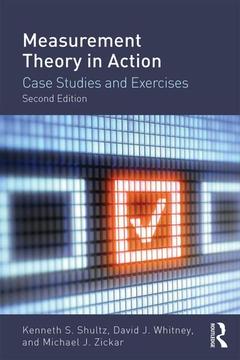Measurement Theory in Action (2nd Ed.) Case Studies and Exercises, Second Edition
Auteurs : Shultz Kenneth S, Whitney David, Zickar Michael J

This book helps readers apply testing and measurement theories. Featuring 22 self-standing modules, instructors can pick and choose the ones that are most appropriate for their course. Each module features an overview of a measurement issue and a step-by-step application of that theory. Best practices provide recommendations for ensuring the appropriate application of the theory. Practical questions help students assess their understanding of the topic while the examples allow them to apply the material using real data. Two cases in each module depict typical dilemmas faced when applying measurement theory followed by Questions to Ponder to encourage critical examination of the issues noted in the cases. Each module contains exercises some of which require no computer access while others involve the use of SPSS to solve the problem. The book?s website houses the accompanying data sets and more. The book also features suggested readings, a glossary of the key terms, and a continuing exercise that incorporates many of the steps in the development of a measure of typical performance.
Updated throughout to reflect recent changes in the field, the new edition also features:
--A new co-author, Michael Zickar, who updated the advanced topics and added the new module on generalizability theory (Module 22).
-Expanded coverage of reliability (Modules 5 & 6) and exploratory and confirmatory factor analysis (Modules 18 & 19) to help readers interpret results presented in journal articles.
-Expanded Web Resources, Instructors will now find: suggested answers to the book?s questions and exercises; detailed worked solutions to the exercises; and PowerPoint slides. Students and instructors can access the SPSS data sets; additional exercises; the glossary; and website references that are helpful in understanding psychometric concepts.
Part 1 provides an introduction to measurement theory and specs for scaling and testing and a review of statistics. Part 2 then progresses through practical issues related to text reliability, validation, meta-analysis and bias. Part 3 reviews practical issues related to text construction such as the development of measures of maximal performance, CTT item analysis, test scoring, developing measures of typical performance, and issues related to response styles and guessing. The book concludes with advanced topics such as multiple regression, exploratory and confirmatory factor analysis, item response theory (IRT), IRT applications including computer adaptive testing and differential item functioning, and generalizability theory.
Ideal as a text for any psychometrics, testing and measurement, or multivariate statistics course taught in psychology, education, marketing and management, professional researchers in need of a quick refresher on applying measurement theory will also find this an invaluable reference.
Part 1: Introduction 1. Introduction and Overview 2. Statistics Review for Psychological Measurement 3. Psychological Scaling 4. Test Preparation and Specification Part 2: Reliability, Validity, and Test Bias 5. Reliability Overview: Classical Test Theory 6. Estimating Reliability 7. Content Validity 8. Criterion-Related Validation 9. Construct Validity 10. Validity Generalization and Psychometric Meta-Analysis 11. Test Bias, Unfairness, and Equivalence Part 3: Practical Issues in Test Construction 12. Developing Tests of Maximal Performance 13. Classical Test Theory Item Analysis 14. Scoring Tests 15. Developing Measures of Typical Performance 16. Response Bias Part 4: Advanced Topics 17. Combining Predictors using Multiple Regression 18. Exploratory Factor Analysis 19. Confirmatory Factor Analysis 20. Item Response Theory 21. Applications of Item Response Theory: Computer Adaptive Testing and Differential Item Functioning 22. Generalizability Theory
Kenneth S. Shultz is Professor of Psychology at California State University, San Bernardino.
David J. Whitney is Professor and Department Chair of psychology at California State University, Long Beach.
Michael J. Zickar is Professor and Department Chair of Psychology at Bowling Green State University in Ohio.
Date de parution : 11-2013
15.2x22.9 cm
Disponible chez l'éditeur (délai d'approvisionnement : 14 jours).
Prix indicatif 64,97 €
Ajouter au panierThèmes de Measurement Theory in Action :
Mots-clés :
test; takers; developers; item; response; true; score; classical; sme; rating; Test’s Internal Consistency Reliability; IRT Model; GMA; Armed Services Vocational Aptitude Battery; Individual True Score; GPA; Free Response Items; DIF; Data Set; Grade Point Average; Test Takers; Criterion Related Validity; IRT Procedure; True Score; GT Analysis; Item Parameters; Nonuniform DIF; Case Study; GT Framework; CFA Model; Item Error Terms; Graduate GPA; 2PL Model; Predicted Criterion Score; Variance Component Estimates



